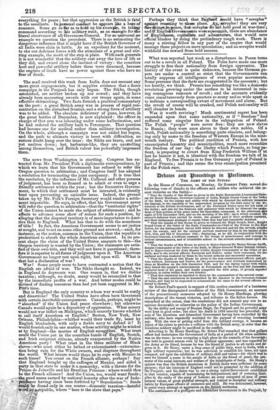What was reported last week as a disturbance in Posen
turns out to be a revolt in all Poland. The Poles have made one more struggle to free their nationality from foreign oppression. The history of the event is quite unknown, because the German pa- pers are under a control so strict that the Governments can totally suppress all intelligence of even popular movements. Some presume that the facts are exaggerated in the accounts ; but too hastily, we -think. Prussia has something too like a domestic revolution growing under the surface to be interested in rais- ing contagious rumours of revolt ; and the accounts evidently come simultaneously from quarters so many and so wide apart as to indicate a corresponding extent of movement and alarm. But the revolt of course will be crushed, and Polish nationality will still slumber in bonds.
Was it worth reviving? Much sentimental regret has been expended upon that same nationality, as if " freedom" had suffered some singular blow in the subjugation of Poland. The Polish " people" were never free : they are now slaves to Russia • they were once slaves to their own nobles. Of a truth, Polish nationality is something quite obsolete, and belong- ing only. by name to the freedom of Western Europe in the nine- teenth century. The political condition of Prussia, with her emancipated tenantry and municipalities, much more resembles the freedom of our day : the liberty which Prussia, so long p,- tient, is preparing to extort from Ring Frederick William if it last he bestow it not, is identical with the freedom we talk of in England. To free 'Prussia is to free Germany : part of Poland is part of Prussia ; and this seems the true emancipation promisCd for the Polish race.


























 Previous page
Previous page